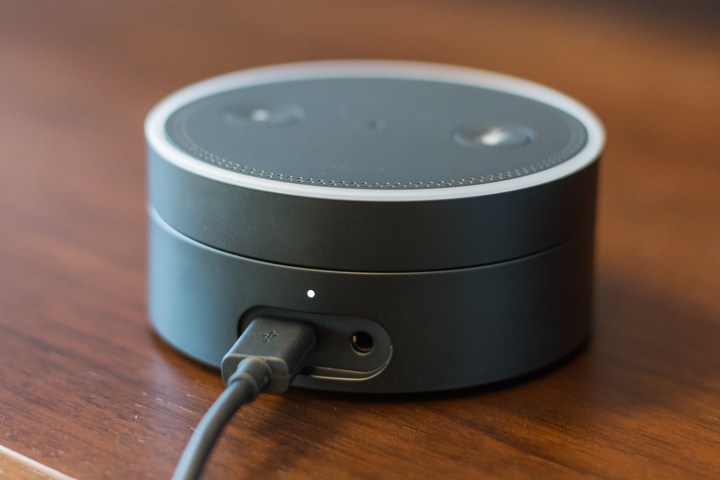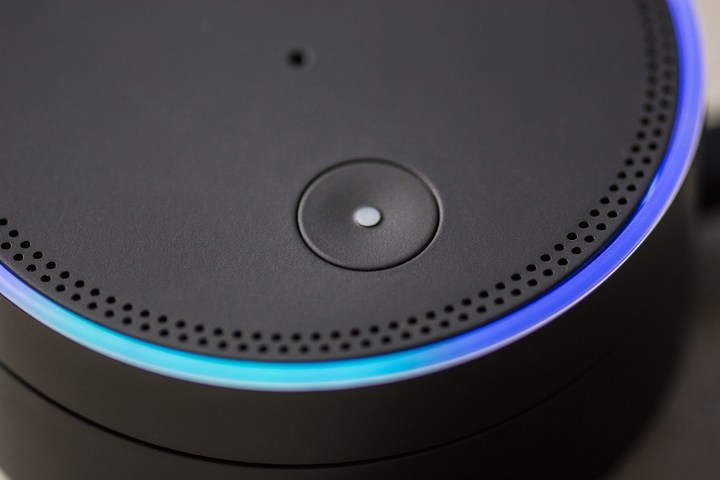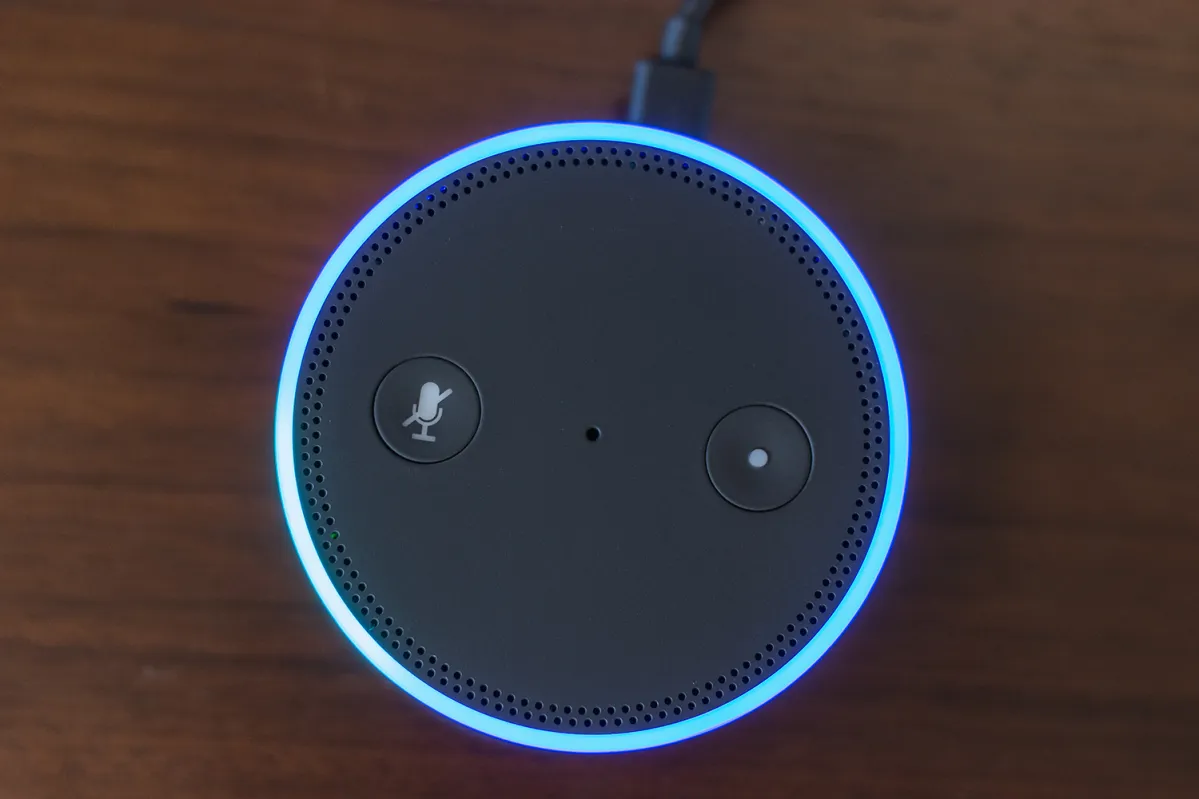“Amazon's Echo Dot is a genius way to make any stupid speaker smart.”
- Compact and unobtrusive
- Connects to any audio system
- Far-field voice recognition
- Constantly evolving functionality
- On-board sound is weak
When Amazon introduced the Echo Speaker, we were less excited by what it did out of the box, and more by what it could ultimately become. Today, the Echo’s potential is only beginning to be realized, but it’s already one of the most versatile smart home devices available today. Even with competition from the cuter Google Home Mini and now the Dot 3.0 which features stronger sound quality, the original Dot, for now anyway, still holds up as the most sought-after smart speaker on the market.
Of course, without Alexa – the snappy voice inside – Amazon’s Echo wouldn’t be interesting at all – just another Bluetooth speaker. Which raises the question: Can’t we have Alexa’s smarts without having to buy the speaker, too? Amazon answered that question with the Echo Dot, a hockey puck-shaped device with all of Alexa’s brains and none of that burdensome, bulky speaker stuff — all at half the price of the original Echo.
Small but powerful
To be fair, the full-size Echo speaker isn’t actually bulky or burdensome, the Echo Dot just makes it look big in comparison. If you were to chop off the top two inches of the Echo, you’d get the Dot, right down to the two interface buttons on top, and a volume control ring running the perimeter. Where it differs is toward the bottom, where you’ll find two ports, one micro-USB jack for power, and one auxiliary output for a hard-wired connection to a powered speaker, or just about any home audio system. While the Google Home Mini has rounded, pebble-like edges, the Dot’s edges are more angular.
Bring your own sound
Given the popularity of Bluetooth speakers today, Amazon is safely betting that many would-be buyers want to try out Alexa, but don’t want to spend $180 on yet another Bluetooth speaker. The Dot will work with any Bluetooth speaker, allowing us to use a Riva S and Riva Turbo X speakers for significantly better sound than the Echo speaker is capable of. It also works with any audio system with RCA inputs, making full-on home theaters an option. In addition, several companies have come out with an Alexa-compatible speaker, so now you can add a Sonos One smart speaker to your setup up so you don’t have to listen to the Echo Dot’s superficial sound.
You don’t have to have a separate speaker or sound system to use the Dot, though. The puck includes tiny speakers on par with what you might get with a decent tablet – acceptable, but not impressive. This allows you to get information like the weather, the time, and sports scores, or use the Dot on its own as an alarm clock.
Amazingly able Alexa
Since Amazon opened up the Alexa Skills Kit and the new Smart Home Skills API, developers have been working to make thermostats, smart lights, and switches controllable through voice commends issued to Alexa. And that’s just the start – smart garage-door openers, security systems, and other smart-home controls are likely right around the corner, like changing the color of lights.
Amazon’s digital assistant is expected to be one of the best smart-home device controllers on the market.
Alexa links with Spotify, Pandora, and a host of other Internet music services and access them via voice control. Along with Prime Music access, this makes calling up a tune from multiple streaming services easier than ever before. You can also select Spotify as your primary music source on the device – an option that wasn’t available before.
Not surprisingly, Alexa can order products from Amazon for you, too. The commands take some getting used to, but if you want, you can tell Alexa to make a purchase, and after a confirmation, the order is placed. Just make sure you have your Amazon purchase preferences in order so you don’t accidentally run the wrong credit card or ship to the wrong address.
Outside of that, Alexa will help you with basic math problems, perform measurement conversions, get you answers to questions with the help of Wikipedia, and countless other capabilities we don’t have room for here.
Alexa’s issues
Nobody is perfect — not even a virtual, digital assistant like Alexa. For instance, she tends to perk up and listen when you don’t want her to. And her response to what is sure to be a misunderstood question will come as a surprise if you’re out of visual range and didn’t realize she was listening.
That brings up another issue: Alexa can seem kind of creepy … at least at first. Alexa is capable of far-field communication, which means you can be across the room but she can still “hear” you. She also knows where you are and proves that by targeting you with an aqua-colored LED indicator strip. This means that Alexa will occasionally pipe in from across the home, which is just a long-distance version of the same creep-factor described above.
To be clear, Alexa is no more invasive and no more a spy than any other so-called digital assistant, like Google Assistant, Siri, or Cortana. The notion of any of them “listening” is also contentious, since they’re only supposed to activate when they hear their “wake-up” word. Still, if you aren’t comfortable with the idea, Alexa isn’t going to change your mind.
Exactly as Amazon advertised
Amazon promised all of Alexa at half the price, and that’s exactly what the Dot is. Practically speaking, we think it makes good sense. Most of us have an audio system or wireless speaker already, and don’t need another one taking up space, but still like the ease of use and ability that Alexa affords.
Frankly, there’s not another device on the market quite like the Dot. Its abilities are unique, useful, and like with the original Echo, will only get better with time. The original Echo was a device we could heartily recommend to anyone, and at half the price, the Echo is an easy Editor’s Choice award winner. While you can get an excellent deal on an older Dot right now, keep in mind that the 3.0 version available in October 2018 will feature better sound. You might want to hold out for that version, which will cost $50 just like the old, tinny sounding version.
Updated September 25, 2018 to note that Amazon has introduced a Dot 3.0, which features better sound.








